Press releases
2022 was the year of systemic and institutional reforms. this is our response to the wide-ranging challenges we face. Prime Minister
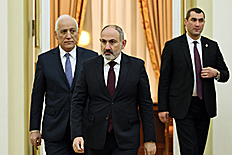 1113x1670px - 737 Kb
1113x1670px - 737 Kb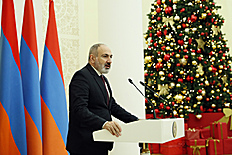 1670x1113px - 743 Kb
1670x1113px - 743 Kb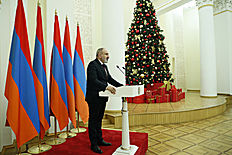 1670x1113px - 782 Kb
1670x1113px - 782 Kb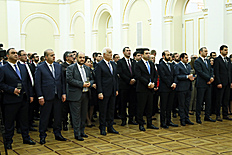 1670x1113px - 672 Kb
1670x1113px - 672 Kb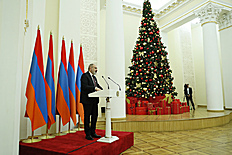 1670x1113px - 811 Kb
1670x1113px - 811 Kb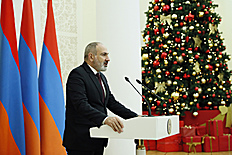 1670x1113px - 721 Kb
1670x1113px - 721 Kb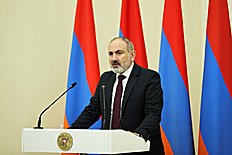 1670x1113px - 569 Kb
1670x1113px - 569 Kb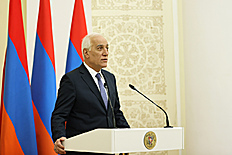 1670x1113px - 611 Kb
1670x1113px - 611 Kb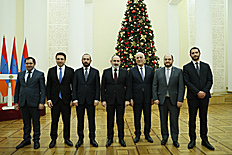 1670x1113px - 772 Kb
1670x1113px - 772 Kb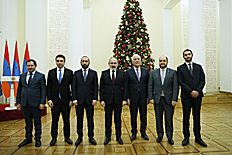 1670x1113px - 794 Kb
1670x1113px - 794 Kb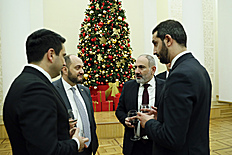 1670x1113px - 661 Kb
1670x1113px - 661 Kb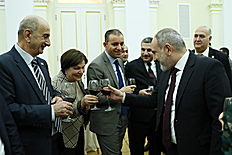 1670x1113px - 607 Kb
1670x1113px - 607 Kb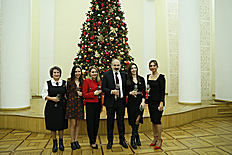 1670x1113px - 840 Kb
1670x1113px - 840 Kb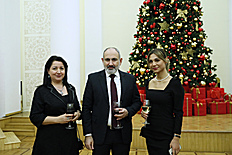 1670x1113px - 672 Kb
1670x1113px - 672 Kb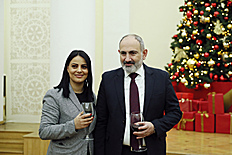 1670x1113px - 714 Kb
1670x1113px - 714 Kb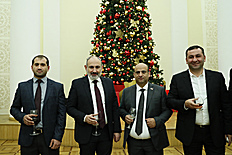 1670x1113px - 699 Kb
1670x1113px - 699 Kb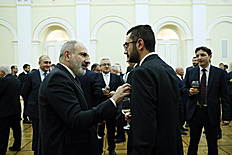 1670x1113px - 517 Kb
1670x1113px - 517 Kb
more 14 photos
Prime Minister Nikol Pashinyan, together with the President of the Republic Vahagn Khachaturyan, participated in the reception organized for the representatives of the state administration system on the occasion of the New Year and Christmas holidays.
Prime Minister Pashinyan made a speech, in which he specifically stated:
"Honorable President of the Republic of Armenia,
Dear President of the National Assembly,
Dear President of the Constitutional Court,
Dear President of the Supreme Judicial Council,
Dear members of the Security Council and Government,
Dear members of the National Assembly,
I am glad to see all of you. Yes, we will summarize the year 2022. Of course, there are many methods of summarizing the year, you can look at it from different perspectives, but if we leave aside the perspectives known to us or summarized so far and consider the issue purely from the point of view of public administration, I must emphasize that for me it is unquestionable that in 2022 we have significantly raised the quality of public administration.
In general, if we summarize the year from the point of view of public administration, we must also record that 2022 was perhaps the most effective year for us in terms of reforms, because this year we implemented huge reforms.
In general, for example, last year, in 2021, I was summing up the year for myself, it is understandable what a difficult year it was: both domestic political crisis, and elections, and problems related to the security environment, escalations, and I was surprised to note that we still managed to implement the agenda of reforms that we had decided for 2021 and also for 2020. This is, you know, a very important result.
2022 is also an extremely important year in that regard. we have implemented many important large-scale changes in the judicial system. I emphasize that we have shown will, for the umpteenth time we are raising salaries in the judicial system, but it is not about money, it is about our commitment and our desire to have an independent judicial system.
We are carrying out large-scale reforms in the armed forces. We are glad that the reforms have reached the Armed Forces and are unfolding with great momentum. I must say that I somehow regret that we did not implement these reforms right away from 2018. We also know why we did not implement it, because our idea was to leave the army, so to speak, as far away from the revolutionary mood as possible. As a result, it turned out that this was not quite the right approach, but that is not the point.
We are implementing huge reforms in the Police. Very soon, in a few days we will have a Ministry of Internal Affairs. We are implementing reforms in the field of the National Security Service. Some of it is visible and some of it is not visible, and it doesn't have to be. We seperating the State Protection Service as an institution. But the most important meaning and purpose of those processes is to increase the effectiveness and purposefulness of the National Security Service.
The Anti-Corruption Committee was formed last year. The anti-corruption, the judicial and investigative system in general was completely transformed. For the first time in our history, we have created a body that has operational capabilities apart from the Police and the National Security Service. Nothing like this has ever happened before. The investigative bodies have undergone various changes, but the operational bodies have remained the same: the Police, the National Security Service. Reforms were carried out in the areas of financial management, public administration and so on.
I emphasize this because it is understandable that we are very focused both emotionally and in every way on the issues related to the security environment, but I also want us not to forget a very important thing, that even in the most critical conditions we have not deviated from the reform agenda even a millimeter. It is necessary to mention the reforms that we are implementing in the field of public education, the reforms that we are also implementing in the field of territorial administration. We have made a 100 percent transition to the proportional representation system in local self-government bodies and so on.
At the same time, yes, the most important reform, which, unfortunately, there is no occasion to discuss in more detail at the Cabinet meetings, concerns the electricity market. And today, when we look at our indicators, we have a 16 percent increase in electricity production compared to last year. Of course, it is also linked with general economic activity, but I think this decision also had a certain impact. School building and other directions should be emphasized.
But yes, this is our response to the wide ranging challenges that we have.
We launched a satellite this year. Now the systems for controlling the satellite are being installed. This is also very important. We have again become witnesses, authors and co-authors of unprecedented historical events.
Seeing representatives of various departments, I remember the reforms. We had promised that we should restore aviation in Armenia. Yes, the aviation sector is developing in the Republic of Armenia. I remember discussions about how appropriate it is for the government to act as a co-investor to establish an airline. Also, our friends from the private sector had a lot of criticism, but it may not be justified only by calculation, intuition is also very important.
We were talking last year that we should outsource the service of enforcement of judicial acts to the private sector. Our colleagues said: what do you want? We said: we want the Compulsory Enforcement Service to work not at a loss, but at a profit. This year we already see that the profitability has increased significantly. We saw reforms in the public transport system in Yerevan, recently we also imported buses and so on.
Reforms were carried out in the Penitentiary Service, the Prosecutor's Office. For the first time in Armenia's 3,000-year history, we have a female Prosecutor General. In other words, I can still list more reforms. As we had adopted in the stratgey the process of consolidation of investigative bodies, we continue to be guided by it.
Today we can say that we are a government of reforms, and I am very happy to record that the reform agenda actually consolidates the public administration system. I feel that the public administration system is working more and more consolidated. Maybe in some places it is not visible and significant due to various interdepartmental problems, but in the bigger picture I see that the public administration system works more consolidated and united. This is an important response to the challenges we face.
Of course, on this way and in the context of all these reforms, I cannot but say special thanks to our parliamentary colleagues, because in the end, most of these reform packages receive legislative regulation. And if our parliamentary colleagues do not support, all these changes will not be possible. I am emphasizing this for a logic that in the end, the Republic of Armenia, its institutional accomplishment, serving its state interests should be a priority issue for us. It is very important that we have the state interest of the Republic of Armenia in front of our eyes as a guideline for actions and as a motive for actions. This is not an easy thing. How many reforms we have in the field of science and other directions.
I am glad that we resist these complications in this way, because not only resisting is important, but also the method of resisting. We face all complications and challenges by implementing institutional, deep, substantive reforms. This is perhaps the only way that is surely the right thing for all cases, because all our problems are institutional and all our solutions must be institutional. All our problems are conditioned by the fact that sometimes, perhaps, much more has depended on individuals than can objectively be and happen.
Our task is to make as little as possible to depend on individuals, although the role of individuals will always be crucial, but more should depend on institutions. This year, we implemented another very important agenda in that path, and I want to thank everyone present for the work done, because, look, today we say unprecedented economic growth, of course, some of our ministry colleagues claim that this is precisely the result of their work, but of course the reality is that it is the result of all of our work. It is very important that under these blows, the state administration system of Armenia has not fallen apart, so to speak, but on the contrary, it has become more consolidated, it has become more purposeful, the tasks are much clearer, the solutions are also much clearer and these solutions are practical, and the quality of practical implementation of those solutions has changed significantly, and we have to admit this.
I want to remind you that the biggest criticism directed at us was poor management and the culmination of these accusations was in 2020, during the coronavirus crisis. At that time we were doing our job tooth and nail, so to speak. Now, when the world is summarizing the results of the management of the coronavirus crisis, we see that the Republic of Armenia was at least one of the best managers of the crisis. It was not noticeable at the time, there were still people and systems that spoke very loudly and their voices were heard. On the contrary, our experience has shown that where we did not show enough courage to go, make reforms, make changes, our failures were especially in those areas. Let's admit this.
Since 2018, we have shown a lot of unnecessary modesty, thinking that we are mostly new in the state administration system, we should not go and enter everywhere. Where we did not enter, where we left it sterile, where we said that the system must have been accomplished, let it live by itself, that is where we had the biggest failures. And on the contrary, where we have entered and done work, we have also made mistakes in that process, but we have not failed in any such system.
We have had difficulties, we have had mistakes that we ourselves have seen, but there has been no failure in any system. On the contrary, where we entered with that revolutionary zeal, partly with knowledge, partly with intuition, we had concrete success in all those places. And it's a pity that we didn't show that courage then. Surely we would have a different situation.
What will we call the year 2022? Yes, we can call it in various ways. we can call it the year of aggression against Armenia, the year of new territorial losses, the year of further complication of the Nagorno Karabakh problem, etc., etc. Yes, we can also call it so, but if we want to evaluate the year objectively, the real assessment is that this was a year of serious, systemic, institutional reforms. Basically, all the years of our administration have been years of systemic, institutional reforms, with the logic that there was a phase when we did not have enough courage to do these reforms in all places. We now have that determination to enter all places, to carry out that reform, to show political will, not to be discouraged, because yes, we know, our knowledge, our experience, our commitment, our determination is enough.
Thanks again for the consolidated job. If this list of reforms needs to be continued, I'm sure I could go on for another 10-15 minutes, but in the end, special thanks again and again to our parliamentary colleagues for protecting those agendas, standing behind them and, of course, our partners implementing those agendas.
Merry Christmas and Happy New Year."